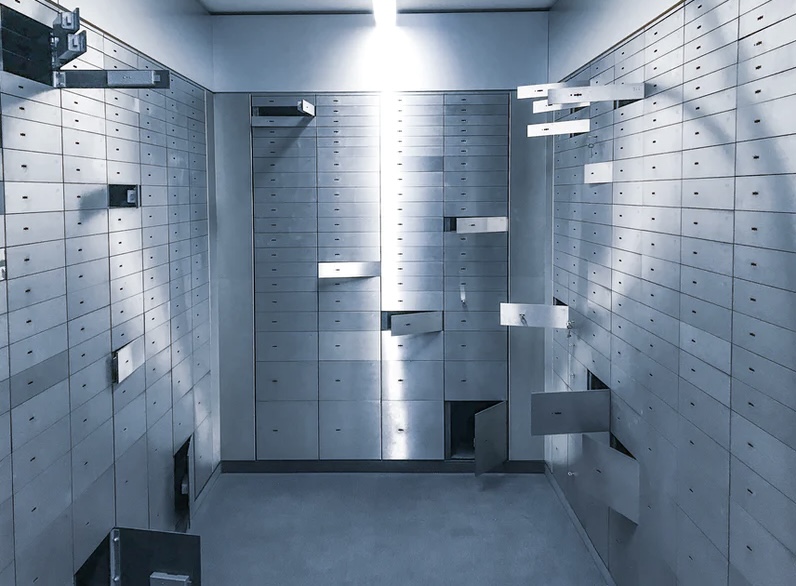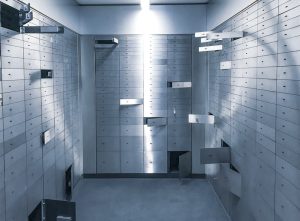
A safe deposit box is not the best solution for all your valuables.
Security and access are often at odds.
Consider your electronic devices or accounts.
If there were no passwords or security codes, you could more easily login from any device.
While it would be convenient, it would also leave these accounts vulnerable.
According to a recent Kiplinger article titled “9 Things You’ll Regret Keeping in a Safe Deposit Box,” this tension also exists with tangible assets.

Some assets are not the most secure in a safe deposit box.
Many people turn to safe deposit boxes for the storage of their valuable documents or belongings.
While this works for some assets (like your baseball card collection), it may be a poor solution for others.
Why?
For starters, banks have limited hours of operation.
This makes access impossible in urgent situations whether in the evenings, on the weekends, or on holidays.
Natural disasters also have been known to impact hours of operation.
In recent months, it has been challenging for many businesses to hire and keep employees.
This in turn leads to delays at a many businesses, including banks.
With this in mind, you should be strategic about what you keep in your safe deposit box.
What should you store elsewhere?
Cash money.
This has been a common guidelines for decades.
Banks discourage people from placing cash in a safe deposit box.
Why?
Although a safe deposit box is at a bank, the FDIC will only protect cash in a bank account.
Passports.
If you do not travel often, you may be tempted to store your passport in a box at the bank.
This could prove problematic if you need to travel quickly.
You should have your passport available in the case of a family emergency, a last minute travel opportunity, or an urgent business trip.
An original last will and testament.
Your original estate planning documents should not be kept in your safe deposit box.
Doing so will complicate things for your executor.
To access your box, the executor will need to prove he or she has a legal right to do so.
For this, the last will and testament is required and "letters testamentary" issuing from the probate judge conferring authority.
Demonstrating the legal authority will be challenging if the necessary document is locked away at the institution refusing access.
Yikes!
Letters of Intent.
This letter provides your loved ones with details regarding such matters as your funeral arrangements and bequest details.
It can take a long time for your executor to access your safe deposit box.
By the time your letter is read, it may be months after your burial (or did you want cremation?).
You see the dilemma.
Instead, consider sending a copy to each recipient listed in your letter of intent.
Power of Attorney.
The problems with placing a power of attorney document in the box are similar to why your passport or your last will and testament should be stored elsewhere.
Your agent will need the financial power of attorney to prove he or she has a right to access the safe deposit box.
You will also need this legal document readily accessible should you become incapacitated suddenly.
Valuables, Jewelry, or Collectibles.
The FDIC will not insure safe deposit boxes or their contents.
There are no laws in place saying banks must reimburse for stolen items.
It is wiser to keep these valuables at home and protect them with a supplemental policy or rider on your homeowner’s insurance policy.
Spare House Keys.
If you do not have your house key, you likely do not have the safe deposit box key.
You would be stuck either way.
Illegal, Dangerous, or Liquid Items.
The contract you sign when opening a box states you cannot store certain things including firearms, explosive, illegal drugs, and hazardous materials.
Even your rare whisky collection would be better stored at home.
Although a safe deposit box can be a valuable place to secure certain belongings, some are better stored elsewhere.
I recall one client who was reluctant to open the safe deposit box of a relative for whom he was the appointed executor.
The reason for his fears?
He had good reason to believe it contained the murder weapon for a crime committed many decades before.
And who said "estate planning" is boring?
Reference: Kiplinger (Sep. 24, 2021) “9 Things You’ll Regret Keeping in a Safe Deposit Box”
REMEMBER: “The choice of a lawyer is an important decision and should not be based solely upon advertisements.”
This statement is required by rule of the Supreme Court of Missouri.
